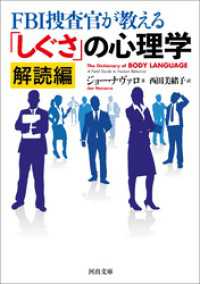- ホーム
- > 洋書
- > ドイツ書
- > Humanities, Arts & Music
- > Religion & Theology
- > christianity
Full Description
This anthology measures the importance that Israeli theology and Judaism had and still have in the individual subjects. Karl Barth has pointed out that the loss of Jewish Christianity means an irreplaceable theological and ecclesiastical loss. He points in the direction in which the book project is moving. This question has been impossible for centuries. To this day, it appears as a break with a long memory tradition that this question is chosen as the starting point for a theological disciplinary history, a story that largely resembles a discipline in Israel. Theologically, Israel has not really established itself with Paul as the permanent root of Christianity. Instead, one always encounters open or hidden forms of repressing or even replacing Israel with concepts and methods of Christian theology. Only after the Shoah and Catholic in the course of the changes of the 2nd Vatican Council did the theological starting point change. This volume asks about the reasons and the consequences, about the requirements and the meaning of this theological-ecclesiastical finding. But then you have to ask: Why was this necessary? How long has this been possible? And what changes in view of our theological knowledge? These questions guide the discipline history of theology in two ways. It is about the location of the Jewish in the individual disciplines. And it is about the discipline of the Jewish through theology. It is about repressions, replacements. It is about theologically perceiving Israel as a rejected part.







